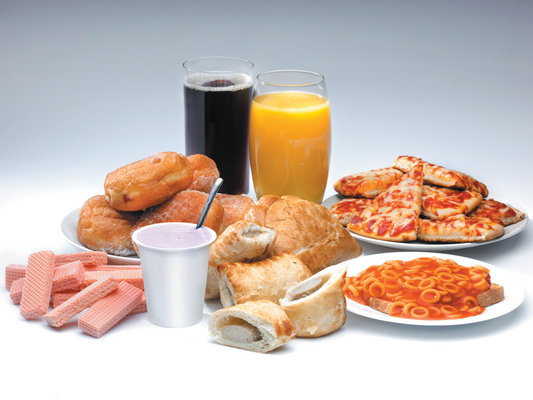What is HYROX?
HYROX is a fitness event that has grown great popularity around the world. It is a form of HIIT that includes a 1km run and 1 functional workout that is repeated 8 times, with different functional exercises each round. Between each 1km run, there are 8 different functional exercises which include: 1000m Ski Erg, 50m Sled push, 50m Sled pull, 80m Burpee broad jumps, 1000m Rowing, 200m Farmers carry, 100m Sandbag lunges and 75/100 Wall balls.
Nutritional Demands?
The high-intensity nature of HYROX combining 8km of running with functional exercises places a large physiological demand on the body. High intensity exercise performed above a person's 70% VO2 max relies on carbohydrates as the predominant fuel source. Therefore, it is vital that enough carbohydrates are consumed to properly fuel these sessions. A modest increase in carbs will help here. Additionally, hyrox elicits exercise-induced muscle damage, so protein consumption is very important to recover optimally after and between sessions. Aim for 2g of protein per kg of bodyweight per day.
Carbohydrate Loading and Race-Week Nutrition
Carbohydrate loading can benefit performance by preventing glycogen depletion, which leads to reduced power output. It’s important to focus on increasing our carbohydrate intake 24-48 hours before the event. This will ensure our muscles are fully loaded with glycogen ready for race day. Avoid heavy loading the night before as this may leave you feeling bloated and sluggish. 6g of carbohydrate per kg of body mass is recommended in the 2 days prior. Additional tips for race week include:- Stick with foods you're familiar with
- Plan your nutrition in advance
- Follow the carbohydrate loading guideline (see above)
- Be proactive with hydration
Event-Day Nutrition
Working backwards from your start time can be useful when planning your race day nutrition. In the 90-to-30-minute window before the event, taking on some carbohydrates in the form of liquids and easily digestible snacks can be beneficial as a last-minute top up of glycogen and fluids. Think sports drinks, carbohydrate solutions, energy gels, bananas etc. Caffeine can be a useful ergogenic aid as this can reduce our perception of fatigue, which will provide useful when it gets tough in the latter stages. This can be taken in pill, gel or liquid form. Note that I would only recommend gels if you have practised consuming these during your training. 90 minutes before your race I would recommend consuming your last carbohydrate snack. Something light and easily digestible such as fruit or a Fuel Hub banana bread. Avoid high fibre and fat foods here.
Pre-Race Meal
The primary aim of the pre-race meal is to top up the body's glycogen stores and provide sustained energy for the race. A high carbohydrate meal such as our Banoffee Overnight Oats would be a great option as it provides complex carbohydrates (the fuel) needed to compete at your best. Avoid trying new foods and eating too much as this may cause gut issues or make you feel sluggish. Similarly, avoid high fat/high fiber foods as these take longer to digest and again, increases the risk of experiencing GI symptoms. The pre-race meal should be practiced weeks in advance, so your body knows what to expect. Consuming the pre-race meal 3-4 hours before the event is advised.
Do I need to consume anything during the race?
Not necessarily. This depends on how long it takes to complete the race. If you are working hard for more than 60 minutes, then consuming readily digestible carbohydrates in the form of sports drinks and gels may be beneficial to maintain energy levels. Consuming electrolyte rich fluids may also provide benefits as this will replenish the fluids and sodium lost through sweat. This can also play a role in preventing muscle cramps. If you are working for under 60 minutes, then you should have enough glycogen stored from the pre-race meal to fuel you for the duration.
Hydration?
During HYROX, core temperatures can increase drastically. To cope with this, our bodies lose heat through evaporation of sweat. This can result in dehydration. Therefore, it is advised people consume plenty of fluids pre, during and post event to avoid impaired performance. Sweat also contains electrolytes, so replacing these is critical in maintaining optimal hydration and preventing muscle cramps. Consuming electrolytes on training days would be a good idea.
Supplements
Saturation products that can be beneficial in the build up to an event (6 weeks prior) include:Creatine Monohydrate (5g/day): Improves speed, strength and power
Beta Alanine (4g/day): Increases muscle carnosine which is the main intracellular buffer of hydrogen ions thus improving high intensity exercise.
An acute supplement which can improve performance on the day;
Caffeine: This can reduce perception of fatigue, improve our reaction time and alertness, as well as increasing sprint and endurance capacity. Take 3-6mg/kg on event day (this needs to be practiced beforehand).

